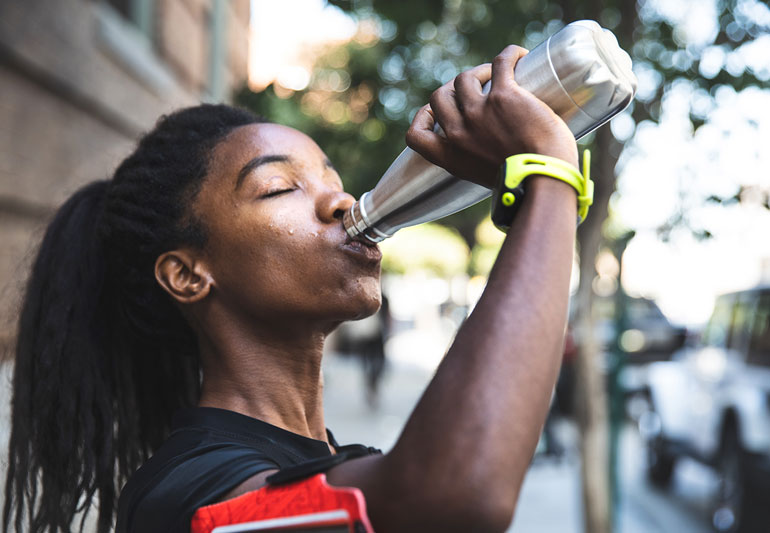While you participate in any health exercise, your physique wants vitamins and fluids that aren’t solely required for energy and endurance in the course of the exercise, but additionally assist you to recuperate from it.
Cleveland Clinic is a non-profit educational medical heart. Promoting on our web site helps assist our mission. We don’t endorse non-Cleveland Clinic services or products. Coverage
That is very true for runners. When you don’t have the correct dietary and fluid steadiness headed into your run, you possibly can threat draining your physique of significant assets too rapidly, or have much less vitality to finish your program. Dietitian Kate Patton, MEd, RD, CSSD, LD, gives recommendation on adopting a weight-reduction plan plan that fuels and hydrates you every time you step out the door.
“Whether or not you’re a brand new or informal jogger, a routine runner or coaching to run a marathon, you want a weight-reduction plan that’s excessive in carbohydrates, and average in protein and fats,” she says. “And as a rule, fluids are extraordinarily vital past merely quenching your thirst.”
Hold your carb consumption up and on observe
About 50% to 70% of your weight-reduction plan must be carbohydrates.
“Resist the urge to leap on the low-carb bandwagon since you want them for vitality should you’re a runner or somebody who does common cardio train,” Patton says. Carbs gasoline the physique with glycogen. This gasoline is then saved in your muscle mass, which helps them carry out. Not having sufficient carbs or reducing carbs out of your weight-reduction plan utterly will make you’re feeling fatigued and sluggish.
“When you run about one hour per day, it’s best to purpose to eat about 5 to seven grams of carbohydrates per kilogram of your physique weight, For endurance runners who prepare one to a few hours per day, six to 10 grams of carbohydrate per kilogram physique weight is required” Patton recommends.
Right here’s the right way to calculate what number of carbs you want:
- First, convert your weight from kilos to kilograms by dividing your weight by 2.2.
- Then, multiply that quantity by really useful grams of carb 5-10.
- So should you weigh 150 kilos, that’s 150 ÷ 2.2 = 68 kilograms. After which 68 kilograms x 7 = 476 grams of carbs wanted.
The most effective locations to get carbohydrates
To make sure that you’ll have vitality for working, make a listing and refill on these wholesome sources of carbohydrates:
- Complete grains (entire wheat, rye, or sprouted grain).
- Bread, pasta, barley, cereal, crackers.
- Gluten free grains like rice, quinoa, buckwheat, corn.
- Milk.
- Legumes.
- Yogurt.
- Starchy veggies like candy potatoes, peas, butternut squash, acorn squash spaghetti.
- Fruits.
While you’re doing all your pre-run buying, learn the labels for carbohydrate content material and be sure you take portion dimension and your how lengthy you’ll be working into consideration.
Pack in loads of protein
Protein helps construct and restore muscle tissue. The correct amount of protein promotes muscle development, particularly if you do energy coaching.
Right here’s how to determine how a lot protein it’s best to eat to maintain for a one-to-two hour run:
- First, convert your weight from kilos to kilograms by dividing your weight by 2.2.
- Then multiply that by the typical quantity of protein that average routine runners ought to eat, which is 1.2 to 1.4 grams of protein per kilogram of physique weight.
- So should you weigh 150 kilos, that’s 150 ÷ 2.2 = 68 kilograms. After which 68 kilograms x 1.2 or 2.2 = 81 to 95 grams of protein wanted.
“Protein consumption at increased ranges can even assist you to achieve extra muscle mass (and subsequently energy) and might cut back the lack of muscle as you drop pounds over time throughout your program,” Patton says.
Good sources of protein
Wholesome sources of protein are simple to get rapidly. To construct and preserve your muscle energy for working, refill on these high-protein meals:
- Meat (The healthiest are lean, uncured meats.)
- Poultry.
- Fish (Tuna, salmon or trout are excessive in wholesome omega-3 fat).
- Eggs.
- Milk.
- Cottage cheese.
- Beans.
- Lentils.
- Quinoa.
- Plain Greek yogurt.
- Tofu.
- Nuts and seeds (additionally nice supply of wholesome unsaturated fats).
With the fitting mixture of protein and carbohydrates, your weight-reduction plan will likely be optimized for energy and endurance throughout your working routine.
Keep hydrated
While you train, your muscle mass generate warmth. Your physique must eliminate that warmth to keep up a traditional temperature — by sweating. Sweating in flip reduces your physique’s water stage, and this lack of fluid must be replenished throughout and after your exercise. Patton emphasizes that you have to drink loads of liquids to keep away from dehydration and muscle cramping.
Your greatest choices so as to add liquids to your weight-reduction plan earlier than, throughout and after working are water and sports activities drinks (sports activities drinks change electrolytes and potassium).
Earlier than or after working, drink these:
- 100% fruit and vegetable juices.
- Milk or chocolate milk (sometimes higher tolerated after your run).
- Unsweetened tea.
- Smoothies made out of actual fruits.
Hold the liquids coming
“For the typical hour-long run, consuming water when you’re working is an effective guideline to remain hydrated,” Patton says. “However precisely how a lot you want will depend on how a lot weight you lose throughout your run, and the way lengthy your precise run time is.”
Listed here are some tips on the right way to keep hydrated earlier than, throughout and after your exercise
- Earlier than your run — Drink 16-20 ounces of water and or sports activities drink inside 4 hours earlier than working. Drink one other 8-12 ounces of water 10-Quarter-hour earlier than working.
- Throughout your run — Plan on bringing fluids in the course of the run, too. If working lower than 60 minutes. You’ll want a median of three to eight ounces of fluid each 15 to twenty minutes. If working higher than 60 minutes, drink 3-8 ounces of sports activities drink each extra 15-20 minutes to make sure you don’t develop into dehydrated.
- After your run — Rehydrate after your run with a minimum of one other 16 to 24 ounces of fluid (water, sports activities drink, chocolate milk, smoothie) for each pound misplaced to rebalance your fluid ranges.
“All of this takes observe out of the gate,” Patton says. “However in time you’ll have a robust sense of what your physique wants and can start to see how rather more endurance you’ll have throughout your working program.”



















Comments